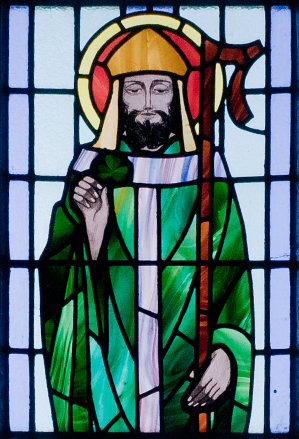In the Christian faith, Saint Patrick's Day honors the 5th century missionary to Ireland. The holiday is celebrated by different church denominations, including Roman Catholics and Protestants. St. Patrick's Day is observed annually on March 17, the anniversary of the famous saint's death. The first St. Patrick's Day celebration took place in America in Boston, Mass., in 1737. The holiday often incorporates elements of Irish culture, such as green colors and traditional Irish foods. But what really occurred with Patrick takes on different tales.
Saint Patrick (387-461 AD) was an English, or perhaps Scottish, missionary to Ireland. Scholars agree that he is a historical figure who converted many of the pagans on the Irish island to Christianity, but many dismiss the legend that has developed about him.
"Patrick's 'real' name was Maewyn Succat, or in Latin, Magonus Succetus," reveals Giraffe Childcare and Early Learning, citing Irish legend, in an educational infographic it created for the holiday. He took on the name Patrick when he became a priest.
Patrick isn't really a "Saint" with a capital "S," having never been officially canonized by Rome, according to historians.

Christianity Today reports Patrick wasn't the first evangelist to Ireland, because Ireland bishop Palladius had been sent in 431, about five years before Patrick went.
Patrick was 16 years old in about the year 405, when he was captured in a raid and became a slave in what was still radically pagan Ireland. Far from home, he clung to the religion he had ignored as a teenager. Even though his grandfather had been a priest, and his father a town councilor, Patrick "knew not the true God." When forced to tend his master's sheep in Ireland, he spent his six years of bondage mainly in prayer. He escaped at the suggestion of a vision, or dream, and returned home.
Much of what is known about Saint Patrick comes from the "Declaration," which was allegedly written by Patrick himself. The Declaration stated that God told Patrick to flee to the coast, where a ship would be waiting to take him home. After making his way home, Patrick went on to become a priest.
Patrick's efforts against the druids eventually were turned into an allegory in which he drove "snakes" out of Ireland, however Ireland reportedly never had any snakes.
Internationally, the holiday is also referenced as the Feast of Saint Patrick. The day has been observed in Ireland on March 17 for hundreds of years. It falls during the fasting season of Lent, but on Saint Patrick's Day the prohibitions against eating meat were lifted, and the Irish celebrate their patron saint with dancing, drinking and feasting on the traditional meal of Irish bacon and cabbage.
Overall, Saint Patrick's Day commemorates the arrival of Christianity in Ireland, and celebrates the heritage and culture of the Irish in general. Celebrations generally involve public parades and festivals, céilithe, and the wearing of green attire or shamrocks. Christians also attend church services.







